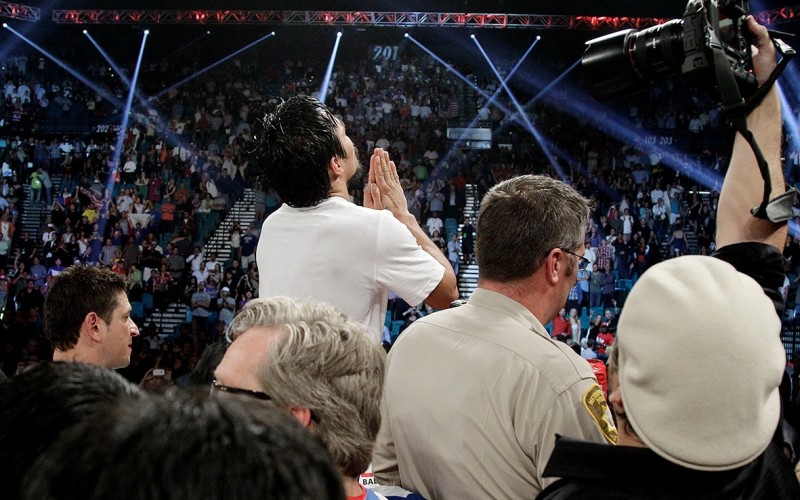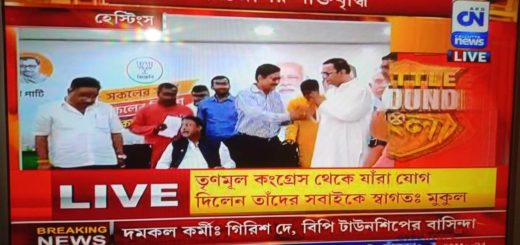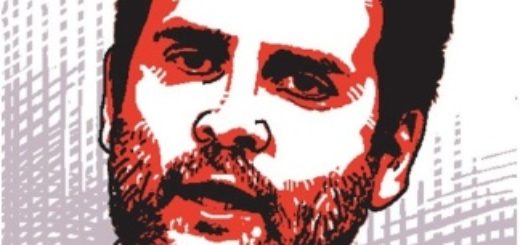Catholicism on the ropes in the Philippines

Boxing legend Manny Pacquiao's embracing of Protestantism means the Catholic Church in the Philippines has a fight on its hands
In a packed function room in a Las Vegas hotel, a hymn to Jesus Christ reverberates. At the centre of the crowd, and joining in happily with the passionate warbling, is the diminutive figure of Manny Pacquiao. His passive expression belies the reality that he is one of the world’s most ferocious boxers. His unassuming manner hides the fact he is the Philippines’ most famous son.
This was the scene (see below) just before Pacquiao’s fourth fight with his old rival, the Mexican slugger Juan Manuel Márquez, towards the end of 2012. That same year, the 38-year-old Filipino moved away from Catholicism and towards Evangelical Protestantism. A cradle Catholic, like the vast majority of his compatriots, Pacquiao turned to Protestantism after losing control of his life.
Throughout a remarkable career that began in 1995, Pacquiao has established himself as an undisputed ring legend, becoming the first (and so far only) man to win world titles in eight different weight divisions. His come-forward, all-action style has made him a firm fan favourite. A fight with the other truly great boxer of his generation, Floyd Mayweather Jr, if it finally happens this year, could be the most lucrative sporting event in history.
With all the fame and riches that have come his way thanks to his extraordinary boxing ability, it’s perhaps no surprise that Pacquiao veered off the straight and narrow for a while. Womanising and gambling were his vices. But the turbulent times came to an end, Pacquiao has said, after he heard the voice of God speaking to him in a dream. From that moment on he reconnected with the Bible and, under the tutelage of American pastor Jeric Soriano, became a committed “born-again” Christian. The destructive behaviour was banished, along with the rosary beads he used to wear into the ring.
When times get tough the least most of us can hope for is the love and support of our mothers. Yet when Pacquiao came to his senses after being viciously knocked out by Márquez in that 2012 fight, he discovered his own mother, Dionisia, was far from sympathetic. Previously one of his most vocal and enthusiastic backers, she said she knew the reason for her son’s emphatic defeat.
“That’s what he gets for changing his religion,” she said. “Since the Protestant pastors came into his life, he has not focused on his boxing.”
Despite this familial unhappiness, Pacquiao’s popularity among the country’s overwhelmingly Catholic population does not seem to have diminished. He is a congressman for Sarangani province and was mobbed recently when he made his debut in the national basketball league. In the two years since he became an Evangelical millions of Filipinos have continued to follow and support his efforts in the dark trade of boxing.
Pacquiao’s fellow politicians are also still eager to align themselves with him: another strong indication that his star still shines very brightly in his homeland. After Pacquiao dismantled Chris Algieri in his most recent fight in November, a spokesman for president Benigno Aquino hailed the victory, saying: “Every punch that scored caused the millions of Filipinos to cheer together in every corner of the world.” This continuing support surely has plenty to do with the size of Pacquiao’s celebrity status, but it also emphasises that his journey away from Catholicism reflects that of a growing number of Filipinos. Although the Philippines is still overwhelmingly a Catholic country, there are signs that the Church’s all-pervading influence is starting to wane.
A recent study showed that around 80 per cent of Filipinos identified themselves as Catholics, but only 37 per cent of them said they attended church regularly – a drop from 64 per cent in 1991. Comparatively, around 60 per cent of Protestants, who make up about a 10th of the country’s population, said they were committed churchgoers. Protestantism was first introduced to the Philippines in the late part of the 19th century by American missionaries and it is US preachers like Pacquiao’s Pastor Soriano who are once again leading the charge.
In a few days, Pope Francis will visit the Philippines. He is perhaps the only man in the world capable of drawing a bigger crowd in the country than Pacquiao. His reception is likely to be an ecstatic one. On the face of it, the Philippines will appear every bit the Catholic country it’s assumed to be. But a fight is very much on for its spiritual future. Catholicism might have Francis fighting its corner, but in Manny Pacquiao Evangelicals now possess a powerful weapon of their own.
















